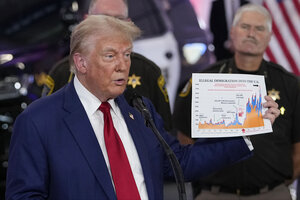Judge delays Trump’s hush-money sentencing until after November election
Loading...
The historic sentencing of former President Donald Trump will not take place before voters decide if he should return to the White House.
A New York state judge was supposed to sentence Mr. Trump in two weeks, following his conviction in May on 34 counts of falsifying business records. But in a four-page order on Friday, Judge Juan Merchan adjourned the sentencing until late November.
The prosecutor in the case, Manhattan District Attorney Alvin Bragg, did not oppose the adjournment, according to the order. Mr. Trump also has a pair of pending motions in the case that could see his conviction – the first ever conviction of a former president – called into question.
Ultimately, the delay offers Mr. Trump a degree of legal reprieve as he enters the final stretch of the presidential campaign. While his convictions in the New York case will remain on record through Election Day, voters will go to the polls without having seen a judge publicly reprimand him for his crimes.
An “impartial” court
Throughout proceedings in this case, Judge Merchan has made clear his intention to treat Mr. Trump like any other defendant in his courtroom. His order on Friday, however, acknowledged the weight of sentencing a former president and a current presidential candidate within 50 days of a presidential election.
“This matter is one that stands alone, in a unique place in this Nation’s history,” he wrote in the order.
“The Court is a fair, impartial, and apolitical institution,” he added, and postponing sentencing “if [it’s] required, should dispel any suggestion” to the contrary.
The delay illustrates the growing challenge – present in all of Mr. Trump’s criminal cases, and sharpened by the looming election – of whether the justice system can, or should, treat him as it would any other criminal defendant.
In his order, Judge Merchan appears to be doing both. While noting that the case is “unique,” he also wrote that defendants “routinely” have their sentencing adjourned. “There is no reason this defendant should be treated any differently than any other,” he added.
A holding pattern
Mr. Trump’s sentencing is now scheduled for November 26th. While it will never be known if a September sentencing would have affected his bid for the White House, he will be hoping that sentencing never happens at all.
The week after Election Day, Judge Merchan will decide if Mr. Trump’s conviction should be vacated in light of the U.S. Supreme Court decision in July that former presidents have broad criminal immunity for crimes they allegedly committed in office. Mr. Trump is also seeking to remove the case to federal court.
In an interview with Fox News after the order came out, Mr. Trump said the case “should never have been brought.”
“I greatly respect the words ‘if necessary’ being used in this decision because there should be no, ‘if necessary,’” he added. “The case should be dead.”
Instead, the case is now in a holding pattern, and the Manhattan court will have little sway over the 2024 election – if indeed it was going to have any sway at all.
Judge Merchan “doesn’t want to give the appearance that he’s intentionally trying to influence the outcome of the election,” says Matthew Galuzzo, a criminal defense lawyer in Manhattan and a former prosecutor in the New York County District Attorney’s Office.
But, he adds, “I’m a little skeptical people are waiting to see what the sentence is before they decide who to vote for.”














